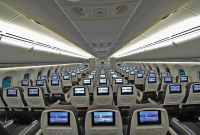Support strong Canadian climate journalism for 2025
WASHINGTON — A coalition of environmental groups sued federal regulators Tuesday over long−sought pollution standards for airliners and cargo planes.
The Center for Biological Diversity and Friends of the Earth filed a lawsuit in U.S. District Court in Washington. The groups allege the Environmental Protection Agency has unreasonably delayed for years using the Clean Air Act to enforce limits on heat−trapping greenhouse gas emissions from aircraft.
A United Nations panel in February proposed an average 4 per cent reduction in fuel consumption during the cruise phase of flight starting in 2028 when compared with planes delivered in 2015. However, planes burn the most fuel during takeoffs and landings, while cruising at high altitudes is already the most fuel−efficient phase of flight.
Environmentalists have criticized that proposed reduction as too modest to significantly curb climate change, and are pushing EPA to enact more stringent standards for domestic aircraft.
Aviation accounts for about 5 per cent of global carbon emissions, with U.S.−owned airliners emitting about 30 per cent of all aircraft pollution worldwide. While carbon emissions from land−based sources are largely in decline, pollution from airplanes is projected to triple by 2050 without stricter limits.
"Airplanes’ skyrocketing climate pollution requires urgent action, not more foot dragging from the Obama administration," said Vera Pardee, a lawyer for the Center for Biological Diversity. "The EPA has dawdled for almost a decade, even as airplane emissions are on track to spiral out of control. We can’t afford more denial and delay in tackling this high−flying threat to our climate."
EPA did not immediately respond to the lawsuit.
The groups first filed a legal petition in 2007 urging the EPA to reduce air pollution from aircraft. A federal judge later ruled that EPA is required to address aircraft emissions under the Clean Air Act. EPA has set 2018 as the earliest possible date for it to issue its final regulations, which the environmental groups say is too long.
The newest Boeing and Airbus designs already meet the proposed international efficiency standards. If adopted as currently proposed, aircraft manufacturers would be allowed to continue selling older, less efficient designs for years to come. Airliners already in use would be exempt from the new standards altogether, ensuring that even dirtier planes could continue to fly for decades.
"The evidence becomes clearer every day that airplanes significantly accelerate climate disruption," said Marcie Keever, legal director for Friends of the Earth. "The Obama administration must act immediately to curb aircraft’s significant contribution to greenhouse gas emissions worldwide."



Comments